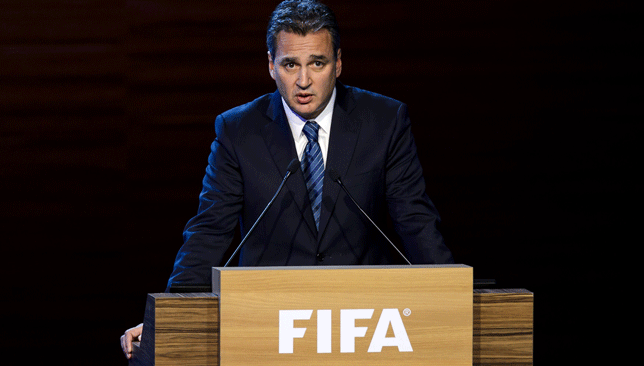
FIFA's chief ethics investigator Michael Garcia has criticised the culture of secrecy at the world governing body and called for greater transparency and leadership in the organisation.
Garcia, who has been investigating the bidding process for the 2018 and 2022 World Cups, said he had been operating under conditions more suitable for "an intelligence agency". He called on the people running FIFA to show leadership and publish the 430-page report – FIFA president Sepp Blatter has said that to do so would threaten witness confidentiality.
Garcia, speaking at an event in London, said: "The investigation and adjudication process operates in most parts unseen and unheard.
"That's a kind of system which might be appropriate for an intelligence agency but not for an ethics compliance process in an international sports institution that serves the public and is the subject of intense public scrutiny."
He added: "Transparency is not intended to embarrass certain individuals by airing dirty laundry or to harm the organisation by showing what went wrong, it's the opposite.
"Where the institution has taken significant steps forward and made that progress, transparency provides evidence of that to the public."
Garcia said FIFA's leaders had to show their commitment to reform.
He said: "The second element that is vital to fulfilling the promise of this reform process is one that I now….understand to be crucial: one at the top.
"More simply put, the second element an institution like FIFA needs in order to meet the challenge of ethics enforcement is leadership.
"What is required is leadership: leadership that sends a message that the rules apply to everyone; leadership that wants to understand and learn from any mistakes or mis-steps the ethics committee may have identified; leadership that makes it clear to everyone – 'This is what we've set up the ethics committee to do, this is why they do it, and this is what they've done'.
"It's that kind of leadership that breathes the life into a code of ethics.
"Because, true reform doesn't come from rules or creating new committee structures. It comes from changing the culture of the organisation."
Garcia, who was speaking at the ABA Criminal Justice Section International White Collar Crime Institute conference in London, cited examples from the International Olympic Committee (IOC) and the NFL where transparency had paid off – and a lack of openness had caused problems.
The IOC brought in rigorous new rules on Olympic bidding after revelations of bribes being paid to bring the 2002 winter Olympics to Salt Lake City, while the NFL has encountered enormous criticism over its investigation of an assault by star player Ray Rice on his fiancee.
Garcia said: "Look at the IOC where allegations concerning Salt Lake City were investigated and those results were published and the IOC moved forward.
"On the other hand where investigations have been opaque, problems and scepticism have lingered. We have seen that recently with the NFL where a lack of transparency in its initial investigation concerning Ray Rice fostered skepticism and questions about the integrity of its leadership.
"Now the NFL has had to bring in outside counsel to investigate the investigation. Notably the NFL has made clear the results of the new investigation will indeed be made public."
Garcia's report has been submitted to the ethics committee's adjudicatory chamber, whose chairman Judge Joachim Eckert from Germany will make an initial response in November ahead of full findings in the spring.